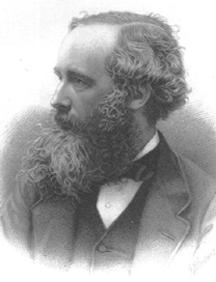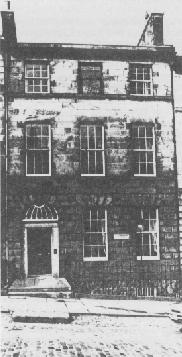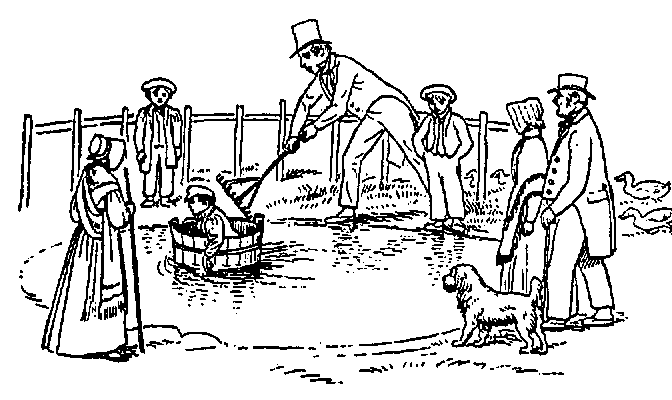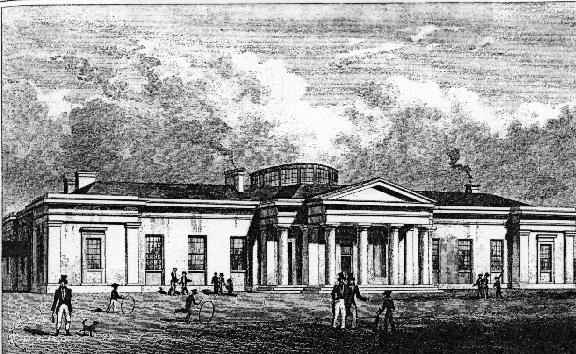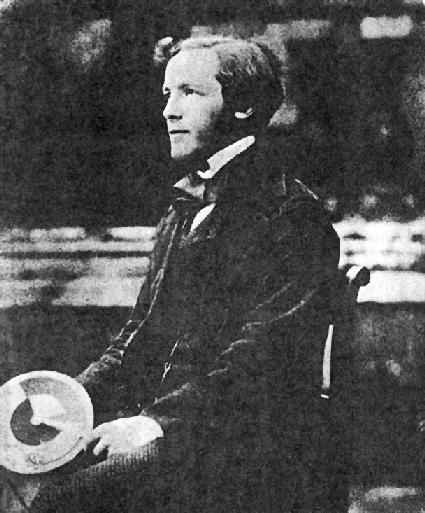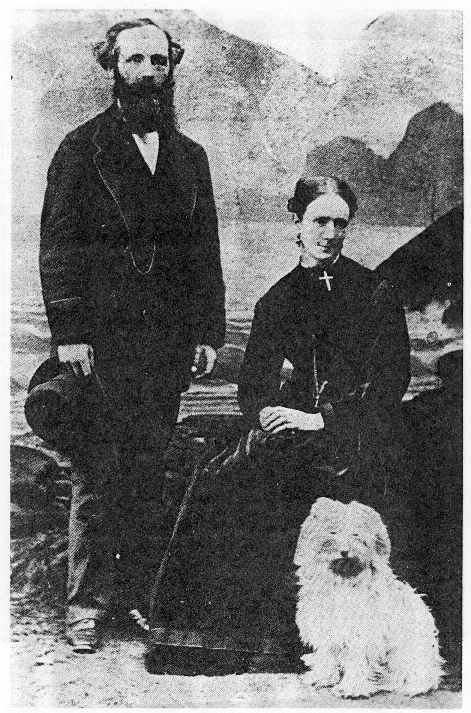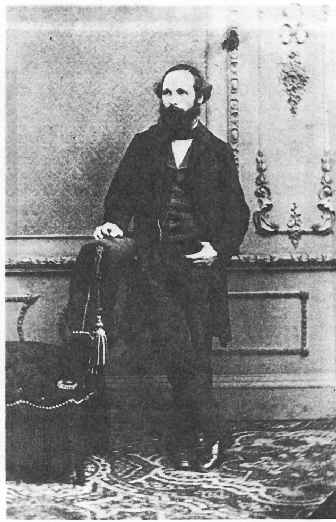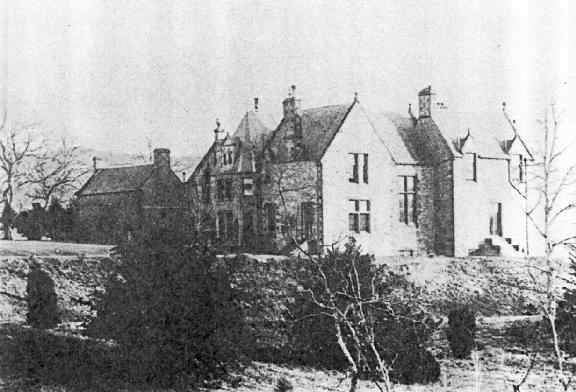James Clerk Maxwell and the Christian Proposition
James Clerk Maxwell and the Christian Proposition
Ian Hutchinson
MIT IAP Seminar: The Faith of Great Scientists, Jan 1998, 2006
1 Introduction
Two great British scientists dominate the intellectual landscape of
electrical science, and indeed all of physics, in the nineteenth
century, Michael Faraday and James Clerk Maxwell. It would be hard to
imagine two more contrasting personalities.
Faraday was English; Maxwell Scottish. Faraday was the son of a poor
blacksmith; Maxwell's father had inherited a substantial estate and
hardly needed to practice the law in which he had been
trained. Faraday had no formal education; Maxwell had the finest
education available. Faraday never held a university position; Maxwell
held professorships at three of the major British
universities. Faraday was one of the most popular scientific lecturers
of his day; Maxwell gained a poor reputation in the class-room.
Faraday knew practically no formal mathematics; Maxwell was one of the
finest mathematicians of his time. Faraday's research dominated
electromagnetic experiments; Maxwell's electromagnetic theory. The
contrasts between these men could be multiplied on and on. Yet they
had one experience in common. Both were committed Christians. It is
the purpose of this brief study to outline how the faith of James
Clerk Maxwell and his science were combined and how they may have
influenced one another.
We should recall Maxwell's major contributions to science. They extend
over a wide variety of fields, including optics, color vision,
elasticity, and the behavior of the dynamical top. The work that
established him as a foremost natural scientist was his analysis of
Saturn's rings, in which he showed that they could not be rigid but
must be made up of swarms of particles whose stability he
analysed. Perhaps inspired by this earlier work, Maxwell was also the
first person to apply the methods of probability to the analysis of
the properties of gases. He invented the idea of a "distribution
function" governing the velocities of the individual molecules of the
gas, and proposed the "Maxwellian" (or sometimes
"Maxwell-Boltzmann") expression for its equilibrium form. Maxwell
went on to work out concrete predictions that could be obtained from
this kinetic theory of gases, for example concerning the behavior of
the viscosity, and he performed experiments to confirm the
predictions. However, the work by which he is most remembered is his
formulation of the equations that govern electromagnetism: Maxwell's
equations. These led immediately to the prediction of electromagnetic
waves and the consequent unification of electromagnetism and
light. Maxwell's formulation of electromagnetic theory in differential
form and his championing of the fundamental nature of the
field in contrast to the action-at-a-distance theories of his day
is, of course, the basis of essentially all of modern physics.
Besides his personal contributions, Maxwell founded and built the
Cavendish Laboratory of experimental physics at Cambridge University,
which was to be arguably the most prolific physics department for at least
the next fifty years.
2 Family and Youth
The reason why the normal reference is to James Clerk Maxwell,
as opposed to just James Maxwell, is bound up with a highly
complicated inheritance of James's father, John. The early Maxwells,
owners of the enormous estate of Middlebie had attempted to protect
the estate from dismantlement by their subsequent heirs through a
variety of legal entanglements (entails), including the requirement
that it could only be inherited by someone bearing the name
Maxwell. Despite these extreme measures, in the eighteenth century,
George Clerk [Maxwell], by an act of parliament, succeeded in selling
off all but a relatively small part, the 1500 acre estate in Galloway
(southern Scotland) to cover debts incurred in mining speculations his
geological interests had led him into. So it was a much more modest
estate that John Clerk inherited in the early nineteenth century, but
one for which it was still well worth changing his name to John Clerk
Maxwell. Thus, when in 1826 James's father, at age 36, married Frances
Cay, they settled at the estate, to become known as Glenlair, and
determined to build a grand manor house and revive its fortunes - an
ideal outlet for John's scientific and technical interests. (He was a
fellow of the Royal Society of Edinburgh).
A daughter born to the Maxwells did not survive. But James was born on
13 July 1831 at 14 India St in Edinburgh.
Figure 1: Birthplace of Maxwell, 14 India St, Edinburgh. [It now
houses the James Clerk Maxwell Foundation]
For the first eight years of his life, spent at the estate, a day's
journey from the nearest city (Glasgow), his education was entirely in
the hands of his mother. He seems to have shown an astonishing memory
even in these early years. At eight he could recite long passages of
Milton and the whole of the 119th psalm (176 verses). Indeed his
knowledge of scripture was already very detailed; he could give
chapter and verse for almost any quotation from the psalms. Clearly,
from this early age, a devout Christian faith and demanding mental
discipline were, for Maxwell, part of the same experience.
He also showed intense interest in the workings of everything. His
standard question was "What's the go o' that", which would be
followed up immediately, if the answer did not satisfy him, with "But
what's the particular go of it". This inquisitiveness found
many outlets in the various outdoor activities that went on in the
estate, particularly as his father worked at its continual improvement
through numerous projects. Undoubtedly his father's patient informal
tutoring was an abiding formative influence. For example, his mother
wrote about him (aged two and a half)
He has great work with doors, locks, keys, etc, and "Show me how it
doos" is never out of his mouth. He investigates the hidden course of
streams and bell-wires ... and he drags papa all over to show him the
holes where the wires go through.
[1]
Or, as his Nanny relates about a new tin plate,
It was a bright sunny day; he held it to the sun and the reflection
went round and round the room. ... He said, "It is the sun, papa; I
got it in with the tin plate." His papa told him when he was a
little older he would let him see the moon and the stars, and so he
did".
[1]
By his own later testimony, James felt deeply the loss of his mother
to cancer when he was eight. Undoubtedly one effect of her death was
to draw James and his father even closer together, a bond of love and
duty that defined much of Maxwell's early character.
3 Edinburgh Academy and University
A local tutor was hired to continue James' education, but this was
completely unsatisfactory. The tutor tried unsuccessfully to obtain
his pupil's attention and obedience through various physical forms of
coercion. We may surmise that the harassment was not all one way. A
drawing by James' cousin Jemima Wedderburn shows James paddling his
floating washtub across the pond away from an unflatteringly portrayed
tutor, who is vainly trying to catch him.
Figure 2: Maxwell escaping his tutor in a washing tub.
This regime continued for two years
until James' aunt Jane (Cay), on a visit to Glenlair realized what was
going on. The tutor was dismissed and in November 1841 Maxwell was
sent to the Edinburgh Academy, lodging with his father's widowed
sister Mrs Wedderburn, at 31 Heriot Row.
The Academy had been founded in 1824 by a group including Sir Walter
Scott, to teach all the "branches of study which are essential in the
education of a young gentleman". It was certainly one of the most
successful Scottish schools of its day (as has been detailed by
Goldman[2]) with an emphasis on Latin, Greek and
Mathematics. By all accounts, however, the science teaching was
extremely weak. The star pupils seemed to know more than their
teachers, perhaps in part as a result of the the `Philosophical
Society' they formed to educate themselves.
Figure 3: Edinburgh Academy, 1828.
Maxwell seems to have been a misfit during his early years at the
Academy. He suffered a serious ragging when he first arrived wearing
rather original clothing designed by his father. His rustic
Gallowegian accent and stutter marked him out, and he early acquired
the nickname `Dafty', perhaps in reference to his quirky humor,
(evident in letters) which must have rendered much of his conversation
unintelligible to boys of slower wit.
After two years of indifferent scholastic performance, Maxwell began
to show his mettle. He gained friends. Lewis Campbell, future
Professor of Classics at St Andrews University and his eventual
biographer, moved in a few doors away (27 Heriot Row). P.G.Tait,
future Professor of Natural Philosophy at Edinburgh University, struck
up a lifetime's friendship, the pair working together through
mathematical problems, which they referred to as propositions, or
"props" for short. He rediscovered for himself the perfect
geometrical figures. He invented a method for drawing "ovals",
mathematical figures more complicated than ellipses, and through his
father's influence at the Edinburgh Royal Society, saw the work
published under the sponsorship of Prof James Forbes, of Edinburgh
University.
At age 16, in October 1847, Maxwell himself entered Edinburgh
University. There, for three years, he would learn not only Physics
under Forbes' lecturing (and also through more informal participation in the
lab), but also the dominant theme of Edinburgh's course: Philosophy. In
this latter subject, the most powerful influence seems to have been
the "common sense" philosopher Sir William Hamilton, professor of
Logic and Metaphysics (not to be confused with the Irish mathematician
William Rowan Hamilton, whose name is perpetuated in Hamiltonian
Dynamics). By all accounts, students at Edinburgh had substantial
liberty for leisure or private study. From his letters to Campbell we
can tell that Maxwell took advantage of both.
... So I get up and see what kind of day it is, and what field works
are to be done; then I catch the pony and bring up the water barrel
... Then I take the dogs out, and then look round the garden for fruit
and seeds, and paddle about till breakfast time; after I that take up
Cicero and see if I can understand him. If so, I read till I stick; if
not, I set to Xen. or Herodt. Then I do props, chiefly on rolling
curves ... After props come optics, and principally polarized
light. Do you remember our visit to Mr Nicol? I have got plenty of
unannealed glass of different shapes ...
[3]
This industry, and the breadth of this education are a critical part
of Maxwell's greatness, especially his philosophical
sophistication. Maxwell was by no means the narrow scientific
technician portrayed in many images of modern scientists. Nor was he
the shallow "generalist" produced by much modern Liberal Arts
education of today. When he read Xenophon or Herodotus, it was in
the original languages.
Maxwell stayed longer than some of his contemporaries at Edinburgh,
perhaps because it took those three years for his father to reconcile
himself to James' desire for a scientific rather than a legal
career. But in 1850 Maxwell departed Scotland for the foremost British
institution of scientific education, Cambridge University.
Figure 4: Young James Clerk Maxwell holding his color top.
4 Cambridge Undergraduate
Maxwell started his Cambridge career at Peterhouse, the oldest
college. Cambridge University had and still has a collegiate
system of living and tutoring, in which there is substantial
independence for the individual college foundations (which date back
many centuries) while exams and lectures are centralized for the
university as a whole. Despite substantial breadth of studies in
classics and beyond, the chief objective of ambitious undergraduates
was to become a "Wrangler", that is, to obtain first class honors in
the mathematical tripos (examination series). It is remarkable how
dominant mathematics was in the educational system of the time, but it
should be remembered that Newton was Lucasian professor of mathematics
in his day, just as Steven Hawking is today. Mathematics at Cambridge
for Maxwell encompassed all of physics as well. Maxwell soon moved to
Trinity College for competitive reasons. His contemporary, E.J.Routh, at
Peterhouse was his equal at mathematics and so a clearer field to a
college Fellowship after the tripos was advisable. There was no such
formidable competition at Trinity.
Maxwell seems to have settled to this regimen with some
restlessness. Early on, he wrote to his father on one occasion:
Man requires more. He finds x and y innutritious, Greek and Latin
indigestible, and undergrads. nauseous. He starves while being
crammed. He wants man's meat, not college pudding. Is truth nowhere
but in Mathematics? ... Must Nature as well as Revelation be examined
through canonical spectacles by the dark-lantern of Tradition, and
measured out by the learned to the unlearned, all second-hand.
[4]
What Maxwell seems to be complaining about here is the emphasis on
technical mastery, especially of mathematics, characteristic of the
Cambridge education. But also, he is feeling intellectually
constrained by the tradition he is required to study. In referring to
the scriptural canon he seems to take for granted that Revelation
(meaning God's revelation to man) is to be examined by reference to
the Bible, but is questioning whether tradition's directed
(dark-lantern) attention is the right approach to the study of nature.
We see here in the youthful Maxwell his wrestling with the balance
between discipline and innovation. He longs to progress past the
traditional studies to propound new "propositions". At the same time
he does not discount the value of traditional study. He immediately
goes on to say,
I am also persuaded that the study of x and y is to men an
essential preparation for the intelligent study of the material
universe ... That few will grind up these subjects without the help of
rules, the awe of authority, and a continued abstinence from unripe
realities.
Then Maxwell launches into a rambling philosophical justification of
academic study in the context of this declaration,
I believe, with the Westminster Divines and their predecessors ad
Infinitum, that "Man's chief end is to glorify God and to enjoy him
for ever".
This is, of course, the keystone of the Presbyterian statement of
faith.
Maxwell's intellectual understanding of his Christian faith and of
science grew rapidly during his Cambridge years. He joined the
"Apostles", an exclusive debating society of the intellectual elite,
where through his essays he sought to work out this understanding.
Eighteen months into his Cambridge education, Maxwell gives us an
insight into his views of Christianity and academic research in a
letter to Campbell[5]
Now my great plan, which was conceived of old, ... is to let nothing
be wilfully left unexamined. Nothing is to be holy ground
consecrated to Stationary Faith, whether positive or negative. All
fallow land is to be ploughed up and a regular system of rotation
followed. ... Never hide anything, be it weed or no, nor seem to wish
it hidden. ... Again I assert the Right of Trespass on any plot of
Holy Ground which any man has set apart. ... Now I am convinced that
no one but a Christian can actually purge his land of these holy
spots. ... I do not say that no Christians have enclosed places of
this sort. Many have a great deal, and every one has some. But there
are extensive and important tracts in the territory of the Scoffer,
the Pantheist, the Quietist, Formalist, Dogmatist, Sensualist, and the
rest, which are openly and solemnly Tabooed. ...
Christianity - that is, the religion of the Bible - is the only
scheme or form of belief which disavows any possessions on such a
tenure. Here alone all is free. You may fly to the ends of the world
and find no God but the Author of Salvation. You may search the
Scriptures and not find a text to stop you in your explorations. ...
The Old Testament and the Mosaic Law and Judaism are commonly supposed
to be "Tabooed" by the orthodox. Sceptics pretend to have read them,
and have found certain witty objections ... which too many of the
orthodox unread admit, and shut up the subject as haunted. But a
Candle is coming to drive out all Ghosts and Bugbears. Let us follow
the light.
One reason for including so extensive (though still incomplete) a
quotation here is that Tolstoy, one of Maxwell's modern biographers,
and clearly someone with little sympathy for religion, grotesquely
misinterprets this letter, calling Maxwell's conviction that only a
Christian can purge his land of these holy spots, "a profession of
faith which it seems is going to be `wilfully left unexamined'!
Maxwell's religious convictions were clearly so deeply imbedded he was
unconscious of the inconsistency"[6]. Tolstoy is
plainly assuming, from his own materialist position, that religious
convictions cannot be held once `examined', and that Maxwell is
therefore bound to be inconsistent. But this is the exact opposite of
the more direct reading of Maxwell's statements. Maxwell believes that
Christianity is true and is indeed the one true "scheme", and
because of that status can afford to open itself to the most complete
examination, even of the most sensitive tabooed spots, in a way that
no other system of belief can.
The extent to which Maxwell in fact "ploughed up" his Christian
beliefs and put them to the intellectual test, can be judged only
incompletely from his writings. But there is plenty of evidence,
especially from his undergraduate days, that he did deeply examine his
faith. Certainly, his knowledge of the Bible was remarkable, so his
confidence in the Scriptures was not based on ignorance.
In the summer of his third year, Maxwell spent some time at the
Suffolk home of the Rev C.B.Tayler, the uncle of a class-mate,
G.W.H.Tayler. The family impressed Maxwell, himself an only child, who
later said it gave him a glimpse of the Love of God, albeit in
"a well-regulated family" in which "There was plenty of willing
obedience but little diligence: much mutual trust, and little
self-reliance"[7]. He fell ill whilst there - the illness
subsequently being attributed to overwork - and was nursed for two
weeks by the minister and his wife. As his class-mate later
recounted concerning the experience[8]:
It was then that my uncle's conversation seemed to make such a deep
impression on his mind. He had always been a regular attendant at the
services of God's house. ... Also he had thought and read much on
religious subjects. But at this time (as it appears from his own
account of the matter) his religious views were greatly deepened and
strengthened.
On his return to Cambridge, Maxwell writes to his recent host a
chatty and affectionate letter including the following
testimony[9],
... I have the capacity of being more wicked than any example that man
could set me, and ... if I escape, it is only by God's grace
helping me to get rid of myself, partially in science, more completely
in society, - but not perfectly except by committing myself to God
...
This is a thoroughly orthodox Christian affirmation of
dependence on God's grace for salvation from sin, but notice how
Maxwell identifies his science as part of God's plan for this
salvation. We can only speculate about what thoughts along these lines
he and Rev Tayler had discussed during the days of his recuperation.
Despite the extreme-sounding confession, Maxwell was, by habit, a very
kindly person. A contemporary recounts how, when he was unable to read
because of eye strain, Maxwell helped him and "often gave up an hour
of his recreation time to read out to me some of the book-work I
wanted to get over"[10].
Maxwell was strongly influenced by Frederick Denison Maurice, a former
"Apostle" and the founder of the Christian Socialist
movement. Maurice became a cause célèbre in 1853 by being
deposed from his position at King's College London for heresy. (To do
with the meaning of the word eternal and whether religion must of
necessity be obvious to the unlearned as well as the learned.) Maxwell
did not adopt Maurice's theological positions as a whole[11],
but he did become convinced of one of Maurice's key tenets, that the
dehumanization of the working class in an industrializing society was
to be prevented by a cooperative approach in which workers were given
greater influence though education. Maurice and his friends set up
Working Men's Colleges, and Maxwell, seeing this as a vital Christian
service, taught Working Men's classes weekly till at least 1866.
It was thus as a young man of remarkable commitments that Maxwell
passed his final exams as Second Wrangler, ceding the first position
to his friend Routh but sharing with him the prestigious Smith prize.
5 Trinity, Aberdeen, London
The year 1855 brought appointment to a Fellowship at Trinity, the
cares of nursing his father through illness (though John was to die the
following year), and, at its end, the publication that launched
Maxwell's electromagnetic researches: "On Faraday's lines of
Force". This paper, by drawing extensive mathematical analogies with
hydrodynamics, helped to make respectable Faraday's "field" approach
to electricity, and showed how to express magnetic induction in the
differential form1 that was later to
prove the key to electromagnetic waves and indeed all of field theory.
His Fellowship at Trinity was brief. On 30 Apr 1856 Maxwell heard from
his sponsor, Forbes, that he was appointed Professor of Natural
Philosophy at Marischal College, Aberdeen.
One of the most important of Maxwell's experiences at Aberdeen, where
his research was dominated by Saturn's rings, must have been meeting
and eventually marrying Katherine Mary Dewar, the principal's
daughter. Not much is known about Katherine herself, and Maxwell's
later biographers conclude from the reticence of Campbell that she was
not well liked by Maxwell's friends. However, James' relations with
Katherine give some useful insights into his spiritual life. Campbell
gives us a few extracts from letters during the last few months of
their engagement in which, despite protesting his lack of skill in
scriptural exposition, Maxwell writes insightful explanations of
passages from Galatians, Ephesians and Philipians that are almost
miniature sermons[12]. He refers to a Sunday school class he
taught while visiting Lewis Campbell. Plainly Katherine and James'
common Christian faith was an important bond from the beginning of
their marriage. Tolstoy, from his materialist viewpoint, is unable to
understand that such spiritual discourse might be a natural aspect of
the continuing relationship of Christian man and wife, but it clearly
was for the Maxwells[13].
Figure 5: Maxwell and his wife, Katherine, 1869.
Another aspect of Maxwell's character that is revealed in his marriage
is the kindness and compassion with which he nursed his wife through
frequent indispositions. By the sound of it, she was something of a
hypochondriac, but James was ever the caring husband and frequently
sat up all night to tend her, even during his own final illness. She
in turn nursed him through a dangerous attack of small-pox, and later
participated in some of his experiments on color vision and on
measurements of the temperature dependence of gas viscosity,
apparently acting as coal stoker for the higher temperatures required!
In 1860 the two Aberdeen colleges were merged, and despite his
seniority, Maxwell was out of a job. This was all to the good because
he was almost immediately appointed to the chair at King's College
London, where he remained till 1865.
Figure 6: Maxwell at King's College London.
In the inaugural lecture, which new professors traditionally gave,
Maxwell discourses on various philosophical aspects of science, for
example "whether the fundamental truths of Physics are to be regarded
as mere facts discovered by experiment, or as necessary truths, which
the mind must acknowledge as true as soon as its attention has been
directed to them."[14] [On balance, Maxwell implies the
latter, but as in much of his philosophical writing, he is far from
clear about it.] He also refers to an idea that he would later develop
in more detail, "that every atom of creation is unfathomable in its
perfection".
Taking this point somewhat out of order we may quote from the version
of this idea that was eventually published in Nature [15]
(and elsewhere) in 1873, where from astronomical observations of
characteristic wavelengths of radiation from atoms he concludes,
We are thus assured that molecules of the same nature as those of our
hydrogen exist in those distant regions, or at least did exist when
the light ... was emitted. ...
Each molecule, therefore, throughout the universe, bears impressed on
it the stamp of a metric system as distinctly as does the metre of the
Archives at Paris, or the double royal cubit of the Temples of
Karnac. None of the processes of Nature, since the time when Nature
began, have produced the slightest difference in the properties of any
molecule. We are therefore unable to ascribe either the existence of
the molecules or the identity of their properties to the operation of
any of the causes which we call natural.
On the other hand, the exact equality of each molecule to all the
others of the same kind gives it, as Sir John Herschel has well said,
the essential character of a manufactured article, and precludes the
idea of its being eternal and self-existent.
Thus we have been led, along a strictly scientific path, very near to
the point at which Science must stop. ...
This is a somewhat unfamiliar inverted form of argument from
design. Maxwell is saying that molecules are perfectly identical to
one another and this suggests that they are, as it were,
manufactured according to an intelligent plan. Maxwell explained
himself in more detail later in a letter "What I thought of was not
so much that uniformity of result which is due to uniformity in the
process of formation, as a uniformity intended and accomplished by the
same wisdom and power of which uniformity, accuracy, symmetry,
consistency, and continuity of plan are ... important
attributes..."[16]. This was not an original idea of
Maxwell's and he gives the original Herschel reference, dated 1851,
but it is interesting to realize that Darwin's "Origin of Species"
was first published in 1859, a year before Maxwell's first oblique
reference to molecular perfection. Clearly, he was well aware of the
extent to which the fashionable liberal academics' argument from
design, based on the perfection of biological adaptation, was
undermined by discoveries pointing to evolution. And though Maxwell
was no theological liberal but accepted the revelation of God through
Jesus Christ, he is pointing to a different perfection in creation,
one which he emphasizes cannot be attributed to evolutionary
adaptation. It is an intriguing thought, not that Maxwell was strictly
correct that atoms are immutable, but his approach is more to
appreciate the ordered uniformity rather than the peculiarity and
complexity of nature, as signs of the creator. Beyond that, Maxwell's
modest claims for the idea are, in my mind, a model for how a
scientist could and should draw attention to the aspects of his
science that point to matters beyond his scientific competence.
Maxwell's breadth of appreciation of Christianity grew still further
during his time in London. To his background of Presbyterianism (in
the Scottish kirk of his father's tradition) and the Anglicanism of
his mother and Cambridge, he added an experience of the Baptists. In
a letter to Rev C.B.Taylor he criticizes obtuse sermons he had heard
at Cambridge and goes on[17],
There is in this street a Baptist, who knows his Bible, and preaches
as near it as he can, and does what he can to let the statements in
the Bible be understood by his hearers. We generally go to him when in
London, though we believe ourselves baptized already.
This confession of Maxwell's willingness to go where the Gospel is
clearly preached apparently embarrasses Campbell, who speculates
(gratuitously) that the habit was a concession to Mrs Maxwell's
"simple Presbyterian" experience. This seems an unlikely
explanation. The tone of Maxwell's remarks leaves little doubt that
his only awkwardness about attending the chapel arose from the
doctrinal differences concerning the validity of infant baptism. That
Maxwell did not allow this to discourage him is another indication
that in spiritual matters he followed his own conscience above all.
6 Laird of Glenlair, First Cavendish Professor
In 1865 Maxwell "retired" from his London position. It had been an
extremely productive tenure, seeing much of his experimental work on
gases to its fruition and the publication of "On Physical Lines of
Force" (in three parts 1861-2, introducing the displacement current
and predicting electromagnetic waves travelling at the speed of light)
and his equations in 1865, but he wanted to complete the building
of the house at Glenlair, as a "sacred trust" to his father. His
independent wealth permitted him to resign from the fairly heavy
burdens of teaching and devote his time to the estate, to some
continental travel, to an extensive correspondence, and to writing his
masterly Treatise on Electricity and Magnetism (1873).
Figure 7: Glenlair as Maxwell left it (ca 1884). [More recent information
about Glenlair can be found at http://www.glenlair.org.uk/.]
The house was finished in 1867, but was just one aspect of being
"Laird" of the estate. Other aspects that were pursued assiduously,
by both James and his father before him, were the nightly reading of the
Bible for the servants, and an almost proprietorial sponsorship of the
church at Corsock, the nearby village.
His correspondence was most notably with William Thomson (later Lord
Kelvin) and his school friend P.G.Tait. Thomson and Tait published their
textbook Treatise on Natural Philosophy in 1867 and were
henceforth referred to in their letters as T and T¢. By a
later notational coincidence, in a work of Tait's, Maxwell's initials
appeared in the equation JCM = dp/dt. Thereafter, in the arcane
insider language of their abbreviated correspondence, often conducted
on postcards, Maxwell became dp/dt.
Figure 8: Postcard concerning mathematics, from Maxwell to Tait.
Another running gag, based on
the coincidence that the Archbishops of York and Canterbury at the
time were also called Thomson and Tait, transformed T and T¢
into "The Archepiscopal Pair". A quicksilver wit was characteristic
of Maxwell's correspondence, showing his fertility of imagination and
convoluted, often poetic, sense of humor.
The time at Glenlair enabled Maxwell to put in order and publish his
electrodynamic theories in their most comprehensive form. It also saw
the introduction of his since famous "Demon"[18]. The
retirement came to an end eventually when Maxwell was persuaded to
accept (in 1871) the newly created Cavendish professorship of
experimental physics at Cambridge - only after Thomson and Helmholtz
had turned it down.
The job was, for the first few years at least, predominantly
administrative. The Duke of Devonshire's bequest funded the
building of the Laboratory, but Maxwell had to manage the construction
itself. Probably his Glenlair experience was an ideal background for
this task. Certainly his conscientious attention made it a great success,
and his organizational abilities more than made up for his weakness as
a lecturer. Perhaps he felt it a duty of the position also to spend
much of his time on editing the scientific papers of Henry Cavendish
- a major work of scientific and historical scholarship.
Maxwell had become a public figure, even though his science was still
greatly under-appreciated, and so it was not surprising that he was
consulted for example by the Bishop of Gloucester and Bristol, about
his ideas relating his faith and science[19]. The Bishop is
wondering whether the creation of the sun after the creation of
light in Genesis 1 can be harmonized by regarding the latter as
referring to "primal vibrations" [i.e. the aether]. Maxwell replies
to this rather naive question with politeness and great wisdom.
... there is a statement printed in most commentaries that the fact of
light being created before the sun is in striking agreement with the
last results of science.
I have often wished to ascertain the date of the original appearance
of this statement, as this would be the only way of finding what "last
result of science" it referred to. It is certainly older than the
time when any notions of the undulatory theory became prevalent...
If it were necessary to provide an interpretation of the text in
accordance with the science of 1876 (which may not agree with that of
1896), it would be very tempting to say that the light of the first
day means the all-embracing aether... But I cannot suppose that this
was the very idea meant to be conveyed by the original author to those
for whom he was writing.
But I should be very sorry if an interpretation founded on a most
conjectural scientific hypothesis were to get fastened to the text in
Genesis ... The rate of change of scientific hypothesis is naturally
much more rapid than that of Biblical interpretations, so that if an
interpretation is founded on such an hypothesis, it may help to keep
the hypothesis above ground long after it ought to be buried and
forgotten.
At the same time I think that each individual man should do all he can
to impress his own mind with the extent, the order, and the unity of
the universe, and should carry these ideas with him as he reads such
passages as the 1st Chap. of the Ep. to Colossians (see Lightfoot on
Colossians, p.182), just as enlarged conceptions of the extent and
unity of the world of life may be of service to us in reading Psalm
viii, Heb ii 6, etc.
Thus Maxwell penetratingly criticizes the misuse of partial scientific
knowledge to interpret scripture, let alone to shore up faith by
supposed harmonization with the latest science. He has no need of
scientific `proofs' of Christianity. Instead, his expressed concern is
that ill-judged linking of specific scientific theories with religion
will be an impediment to the growth of science. And his emphasis, in
relating science and faith, is in science's enhancement of our wonder
at the glory of creation. Certainly a much more enduring theme than
the aether, which has long since been discarded!
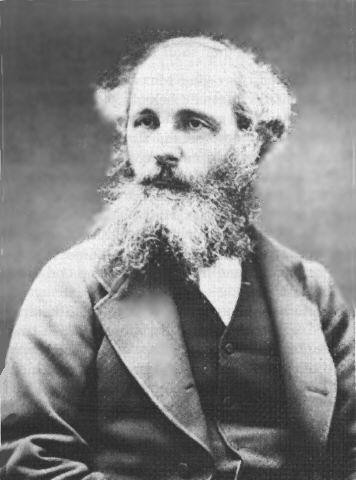 |
Figure 9: Maxwell in his later years.
In his sixth year as Cavendish professor the first symptoms began
of his last long and painful battle with abdominal cancer. He bore it
without complaint, his kindness never soured, his faith never
dimmed. The minister who regularly visited him in his last weeks was
astonished at his lucidity and the immense power and scope of his
memory, but comments more particularly,[20]
... his illness drew out the whole heart and soul and spirit of the
man: his firm and undoubting faith in the Incarnation and all its
results; in the full sufficiency of the Atonement; in the work of the
Holy Spirit. He had gauged and fathomed all the schemes and systems of
philosophy, and had found them utterly empty and unsatisfying -
"unworkable" was his own word about them - and he turned with
simple faith to the Gospel of the Saviour.
As death approached Maxwell told a Cambridge colleague[21]
I have been thinking how very gently I have always been dealt with. I
have never had a violent shove all my life. The only desire which I
can have is like David to serve my own generation by the will of God,
and then fall asleep.
Fall asleep he did on November 5th 1879, and after services of
remembrance at Cambridge was buried in the churchyard of Parton, near
his beloved Glenlair. But his scientific work has proven enduring far
beyond serving merely his own generation, marking him as a genius of
the first rank - one formed and sustained in thought and life and
death by the Christian faith.
A Bibliography
Of the biographical materials about Maxwell's life the predominant
source is the work published by his close friend Lewis Campbell and
colleague William Garnet, The life of James Clerk Maxwell London
1882, which was reprinted as recently as 1969 by the Johnson Reprint
Corporation, New York. The references "C. & G." below are to the
first edition. The second half of it, on Maxwell's scientific
contributions, is less useful, except as an example of the poor
understanding of his work by his contemporaries. A selection of
Maxwell's poetry is also included. (Through the efforts of James Rautio,
an electronic version is now available on the world-wide-web at
http://www.sonnetsoftware.com/bio/maxwell.asp.)
Martin Goldman, The Demon in the Aether, The Story of James Clerk
Maxwell (1983) Paul Harris Publishing, Edinburgh, is the most recent
full length biography, and also the most scholarly. It explores
substantial background material about Edinburgh Academy and the
philosophy of Edinburgh University in Maxwell's day, and provides an
excellent modern summary of Maxwell's science.
Ivan Tolstoy, James Clerk Maxwell, a Biography (1981) University
of Chicago press. Engagingly written and very readable, it attempts
(excessively) to counteract the "hagiographic" tendencies of Campbell
and Garnet. Contains a helpful annotated bibliography.
C.W.F.Everitt, James Clerk Maxwell, Physicist and Natural
Philosopher 1975, Charles Scribner's, New York, devotes three
quarters of its text to a summary of Maxwell's science, but contains
previously unreported discussion of an attachment James had to his
cousin Lizzie (gleefully taken up by Tolstoy as a potential scandal).
E.Garber, S.G.Brush, and C.W.F.Everitt, (Eds) Maxwell on Molecules and
Gases (1986) MIT press, Cambridge Massachusetts. A collection of
sometimes hard-to-find Maxwell writings specifically on molecules.
Paul Theerman, Am. J. Phys. 54, 312 (1986) James Clerk
Maxwell and Religion is a paper focussing specifically on Maxwell's
religion, which draws together most of the material in Campbell and
Garnet, relating to the specific topic.
The year 2006 is the 175th anniversary of Maxwell's birth, and a web
site http://www.maxwellyear2006.org/ has been set up with a
variety of events and information.
References
- [1]
- C. & G., p27
- [2]
- Goldman, p31
- [3]
- C. & G., p120
- [4]
- C. & G., p158
- [5]
- C. & G., p178
- [6]
- Tolstoy, p59
- [7]
- C. & G., p191
- [8]
- C. & G., p173
- [9]
- C. & G., p189
- [10]
- C. & G., p163
- [11]
- C. & G., p218
- [12]
- C. & G., p309
- [13]
- C. & G., p338
- [14]
- Garber, p74
- [15]
- Nature, 8 (1873) 437-442.
- [16]
- Garber, p242
- [17]
- C. & G., p345
- [18]
- Goldman, p123
- [19]
- C. & G., p393
- [20]
- C. & G., p416
- [21]
- C. & G., p421
© 1998, 2006 Ian H Hutchinson.
Footnotes:
1That is, in a form based on local
equations without reference to action-at-a-distance.
File translated from
TEX
by
TTHgold,
version 3.71.
On 18 Mar 2006, 10:48.
